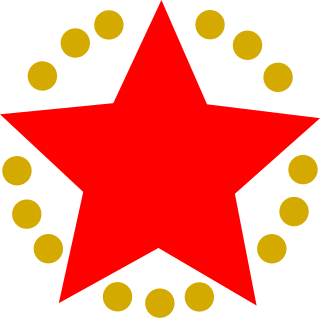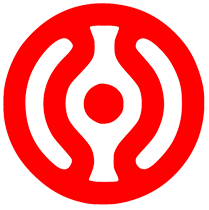
The Supreme People's Assembly is the legislature of North Korea. It is ostensibly the highest organ of state power and the only branch of government in North Korea, with all state organs subservient to it under the principle of unified power. However, in practice it is a rubber stamp legislature which exists to approve decisions made by the ruling party as a formality, and which has little to no real power of its own.

The Chondoist Chongu Party (Korean: 천도교청우당) is a popular front party in North Korea. The party was founded on 8 February 1946 by a group of followers of the Ch'ŏndogyo. The party increasingly came under the influence of the government over time and is now under the effective control of the ruling Workers' Party of Korea. The founding-leader of the party was Kim Tarhyon.

Elections in North Korea are held every four-to-five years for the Supreme People's Assembly (SPA), the country's national legislature, and every four years for Local People's Assemblies. Each candidate is preselected by the North Korean government and there is no option to write in a different name, meaning that voters may either submit the ballot unaltered as a "yes" vote or request a pen to cross out the name on the ballot. Critics argue that North Korean elections are show elections which lack competition and allow the government to claim a veneer of pseudo-democratic legitimacy. A person's vote is not secret, and those who cross off the name on a ballot are often subject to legal and professional consequences. According to official reports, turnout is near 100%.

Parliamentary elections were held in North Korea on 8 March 2009 to elect the members of the 12th Supreme People's Assembly. They were originally scheduled to be held in August 2008 but were postponed for unknown reasons. Observers of North Korea speculated that it was in relation to Kim Jong-il's ill health.

The Cabinet of Democratic People's Republic of Korea is the supreme administrative organ of North Korea. The Cabinet's official newspaper is Minju Choson.

Elections to provincial, municipal, city, county and district people's assemblies were held in North Korea on July 24, 2011.

Elections to provincial (municipal), city (district) and county people's assemblies(도 ·시 ·군 인민회의 대의원 선거) were held in North Korea on July 19, 2015.

Ri Su-yong, also known as Ri Chol (이철), is a North Korean diplomat and politician, serving as the Minister of Foreign Affairs of North Korea from April 2014 until May 2016.

The Order of Kim Il Sung (Korean: 김일성훈장) is the highest order of North Korea, along with the Order of Kim Jong Il, and only second to one honorary title, the Hero of Labour.
The Kim Il Sung Prize (Korean: 김일성상) is an award given by the Government of North Korea to persons in various fields who demonstrate exemplary service to the values of Juche idea. Past winners include the Korean composer Kim Won-gyun, judoka Kye Sun-hui, and the Arirang Festival.

The Vice Premier of the Cabinet assists the Premier of North Korea in guiding the work of the Cabinet of North Korea. The office is also alternatively known as Deputy Prime Minister of North Korea.

The 10th Supreme People's Assembly of North Korea was in session from 1998 until 2003. It consisted of 687 deputies, and held six sessions.

The 11th Supreme People's Assembly of North Korea was in session from 2003 until 2009. It consisted of 687 deputies, and held six sessions.
Ri Pyong-chol is a North Korean marshal and formerly a top advisor of supreme leader Kim Jong Un, who serves as Vice Chairman of the Central Military Commission and a member of the Presidium of the Politburo of the Workers' Party of Korea. He is a relative of Kim's wife, Ri Sol-ju. He currently also serves as a director of a department of the Central Committee of the Workers' Party of Korea (WPK) and First Deputy Director of the WPK Organization and Guidance Department (OGD). General Ri's military and senior Party experience make him an important advisor to Kim Jong Un, especially during crisis. He is an alternate member of the WPK Political Bureau, and a deputy to the Supreme People's Assembly. Ri served in the Korean People's Army Air Force until 2014 at which time he became a senior party official.

Parliamentary elections were held in North Korea on 10 March 2019 to elect the members of the 14th Supreme People's Assembly. The elections were announced on 6 January 2019. With only one candidate on the ballot in each constituency, outside observers described it as a show election. 687 candidates for the DPRK deputies to the SPA were elected. Kim Jong Un did not stand for election, marking the first time that a North Korean leader did not participate as a candidate.

Elections to the provincial (municipal), city (district) and county people's assemblies in North Korea were held on 21 July 2019.

Hwang Sun-hui was a North Korean politician who served in several high-ranking positions in the Workers' Party of Korea (WPK), including in the Supreme People's Assembly and the Central Committee of the WPK. She was affiliated with the Korean Revolution Museum from 1965, and was its director from 1990.

The Ministry of Public Health of North Korea is a central administrative agency of the Cabinet of the Democratic People's Republic of Korea. It was founded on September 2, 1948, when the Cabinet of North Korea was established. Since January 2021, the Minister of Public Health is Choe Kyong-Chol.

The 8th Congress of the Workers' Party of Korea was held at the April 25 House of Culture in Pyongyang from 5 to 12 January 2021. A total of 7,000 people participated in the congress including 5,000 delegates. The Party Congress took place in the midst of the COVID-19 pandemic where no cases were reported.

The vice chairman of the Standing Committee of the Supreme People's Assembly is one of the members that form the Standing Committee of the Supreme People's Assembly. The vice chairman of the SPA Standing Committee is elected by the Supreme People's Assembly alongside the SPA Standing Committee's chairman, secretary general and members. From 1972 until 1998, the vice chairman of the SPA Standing Committee was concurrently the vice chairman of the Supreme People's Assembly.








